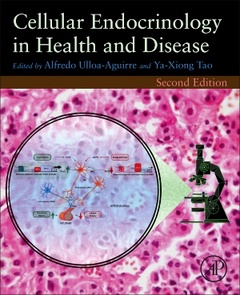Description
Cellular Endocrinology in Health and Disease (2nd Ed.)
Coordinators: Ulloa-Aguirre Alfredo, Tao Ya-Xiong
Language: English
Subjects for Cellular Endocrinology in Health and Disease:
486 p. · 19x23.3 cm · Paperback
Description
/li>Contents
/li>Biography
/li>Comment
/li>
Cellular Endocrinology in Health and Disease, Second Edition, describes the underlying basis of endocrine function, providing an important tool to understand the fundamentals of endocrine diseases. Delivering a comprehensive review of the basic science of endocrinology, from cell biology to human disease, this work explores and dissects the function of a number of cellular systems. The new edition provides an understanding of how endocrine glands function by integrating information resulting in biological effects on both local and systemic levels, also providing new information on the molecular physiopathogenesis of endocrine neoplasic cells.
The new edition expands the most used chapters from the first edition and proposes a series of substitutions and additions to the table of contents. New chapters cover signaling, brown adipose tissue, hypothalamic cell models, cellular basis of insulin resistance, genetics and epigenetics of neuroendocrine tumors, and a series of chapters on endocrine-related cancer.
Providing content that crosses disciplines, Cellular Endocrinology in Health and Disease, Second Edition, details how cellular endocrine function contributes to system physiology and mediates endocrine disorders. A methods section proves novel and useful approaches across research focus that will be attractive to medical students, residents, and specialists in the field of endocrinology, as well as to those interested in cellular regulation. Editors Alfredo Ulloa-Aguirre and Ya-Xiong Tao, experts in molecular and cellular aspects of endocrinology, deliver contributions carefully selected for relevance, impact, and clarity of expression from leading field experts
1. Thyroid hormone receptors and their role in cell proliferation and cancer" 2. The molecular cell biology of anterior pituitary cells 3. Sensing calcium levels –the biology of the parathyroid cell 4. The biology of pituitary stem cells 5. The Na(+)/I(-) symporter and biosynthesis of thyroid hormones 6. The FSH signaling network in Sertoli cells 7. Epigenetics and pituitary cell growth 8. Epigenetics and metabolic abnormalities 9. Unraveling the mechanisms underlying GnRH pulse generation: test of the proposed role for KNDy neurons 10. Proteomics and Cellular Signaling 11. Transcriptome analysis of adrenocortical cells in health and disease 12. Bone as an endocrine organ 13. The control of steroidogenesis of adrenocortical cells 14. The adipocyte as endocrine target 15. Insulin secreting cell lines: potential for research and diabetes therapy 16. The architecture of human pancreatic islets as revealed by molecular imaging 17. Computational models to decipher cell signaling pathways 18. The regulation of theca cell-granulosa cell dialogue by endocrine and paracrine factors 19. Unraveling the mechanism of action of the GnRH pulse generator: the TAC3/TAC3R-dinorphin-Kiss1/Kiss1R neuronal connection 20. Endocrinology of the single cell 21. Altering aberrant intracellular trafficking of cell surface membrane receptors by pharmacological chaperones 22. Deiodinases: taylors that suit intracellular thyronine demands 23. Micro RNAs and non-coding RNAs in beta–cell function
the National University of Mexico (UNAM), where he heads the Research Support Network of the National Institutes of Health in Mexico City. He received his
graduate training in internal medicine and reproductive endocrinology at the National Institute of Medical Sciences and Nutrition SZ and earned the Doctoral degree in Medical Sciences from the UNAM. He received postdoctoral training at the University of Pennsylvania, Philadelphia PA, and has been visiting scientist at the Oregon National Primate Resarch Center, OHSU, Beaverton OR, and the Institut National de la Recherche Agronomique, in Tours, France (Le Studium Scientist). He is currently a member of the Studium Consortium for Research and Training in Reproductive Sciences (sCORTS, Le Studium, Orléans, France). An internationally recognized physician-scientist, Dr Ulloa-Aguirre has developed programmes in both clinical and basic research. His laboratory focuses on the structure-function relationship of gonadotropins and gonadotropin receptors as well as on the gonadotropin-releasing hormone receptor, with particular emphasis on the factors and mechanisms that control intracellular trafficking of these receptors. He is the author or co-author of over 165 research publications and several book chapters.
Dr. Ya-Xiong Tao is currently Professor of Physiology at Auburn University College of Veterinary Medicine in Auburn, Alabama, USA. He has been working on several G protein-coupled receptors, including gonadotropin receptors regulating reproduction, and melanocortin receptors regulating energy and glucose homeostasis. He has published extensively in peer-reviewed biomedical journals and obtained funding for his research from National Institutes of Health, American Diabetes Association and American Heart Association, among others. He has delivered nume
- Explores endocrine cells biology in normal and pathologic conditions
- Covers new aspects of endocrine cell function in distinct tissues
- Provides a view into the biological effect in local and systemic levels
- 15 new chapters covering the recent developments in the field
These books may interest you

Endocrinology of the Vasculature 116.04 €



